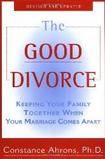Trying to Have a Good Divorce
 Divorce has become common but that makes it no less painful. It is one of the most difficult and traumatic processes you can go through. A relationship you expected to provide love, companionship and security for the rest of your life has fallen apart. A sense of failure is common. Fear for what the future will bring can be intense. The desire to blame your spouse can be all-consuming. The range and intensity of unpleasant emotions may be the greatest you will ever experience.
Divorce has become common but that makes it no less painful. It is one of the most difficult and traumatic processes you can go through. A relationship you expected to provide love, companionship and security for the rest of your life has fallen apart. A sense of failure is common. Fear for what the future will bring can be intense. The desire to blame your spouse can be all-consuming. The range and intensity of unpleasant emotions may be the greatest you will ever experience.
If you have minor children, they will now not have the opportunity to grow up in the “normal” family you wanted to provide for them. Yet you will have to continue to parent your children with the person who may seem to you to be largely responsible for the divorce.
In the midst of all the upset, many important decisions need to be made to allow you to separate your lives. Many decisions relate to the children but most are financial. They involve somehow getting along with less. Making these decisions is complicated by the often significant imbalances between you and your spouse as regards earning ability, knowledge of your finances and comfort in dealing with financial affairs.
 How you manage the divorce may well have repercussions far into your future. For many people, the financial strain, trauma and anger weigh on them for many years. Yet for others, a good divorce becomes a positive learning and transformative experience that opens their life into new and refreshing possibilities. They remain on friendly terms with their former spouse after the divorce is completed.
How you manage the divorce may well have repercussions far into your future. For many people, the financial strain, trauma and anger weigh on them for many years. Yet for others, a good divorce becomes a positive learning and transformative experience that opens their life into new and refreshing possibilities. They remain on friendly terms with their former spouse after the divorce is completed.
How you come through this life crisis depends largely on how you approach it personally and the process you choose for doing so. There naturally is disappointment and resentment when a marriage ends, but that does not mean that the divorce has to be an acrimonious battle.
Try to resolve and end any blame, guilt, and resentment. You and your spouse probably did about the best you could given your individual limitations and shortcomings. You both made mistakes and had failed expectations. Try not to focus on what your spouse did or didn’t do. Instead focus on the present and the future, and how you can be fair to yourself, your children, and your spouse. If you can find some peace of mind it will be calming for all concerned and it will facilitate a peaceful resolution.
It is possible to have an amicable, good divorce. It takes two people who are willing and able to focus on their future instead of the past, and who want to find solutions that will work for both of them. In a healthy divorce, mutual respect and concern for the best interests of the children prevail. If the process you choose is respectful and compassionate, it will be easier to have a healthy, good divorce. When communication is difficult and trust has been shaken, it can help greatly to work with an impartial mediator who can help you through all the issues, exploring options and finding common ground. 

Two excellent and inspiring books about how to have a good divorce are “The Good Karma Divorce” by Judge Michele Lowrance and “The Good Divorce” by Constance Ahrons.
There are basic requirements for getting divorced or legally separated in California.







